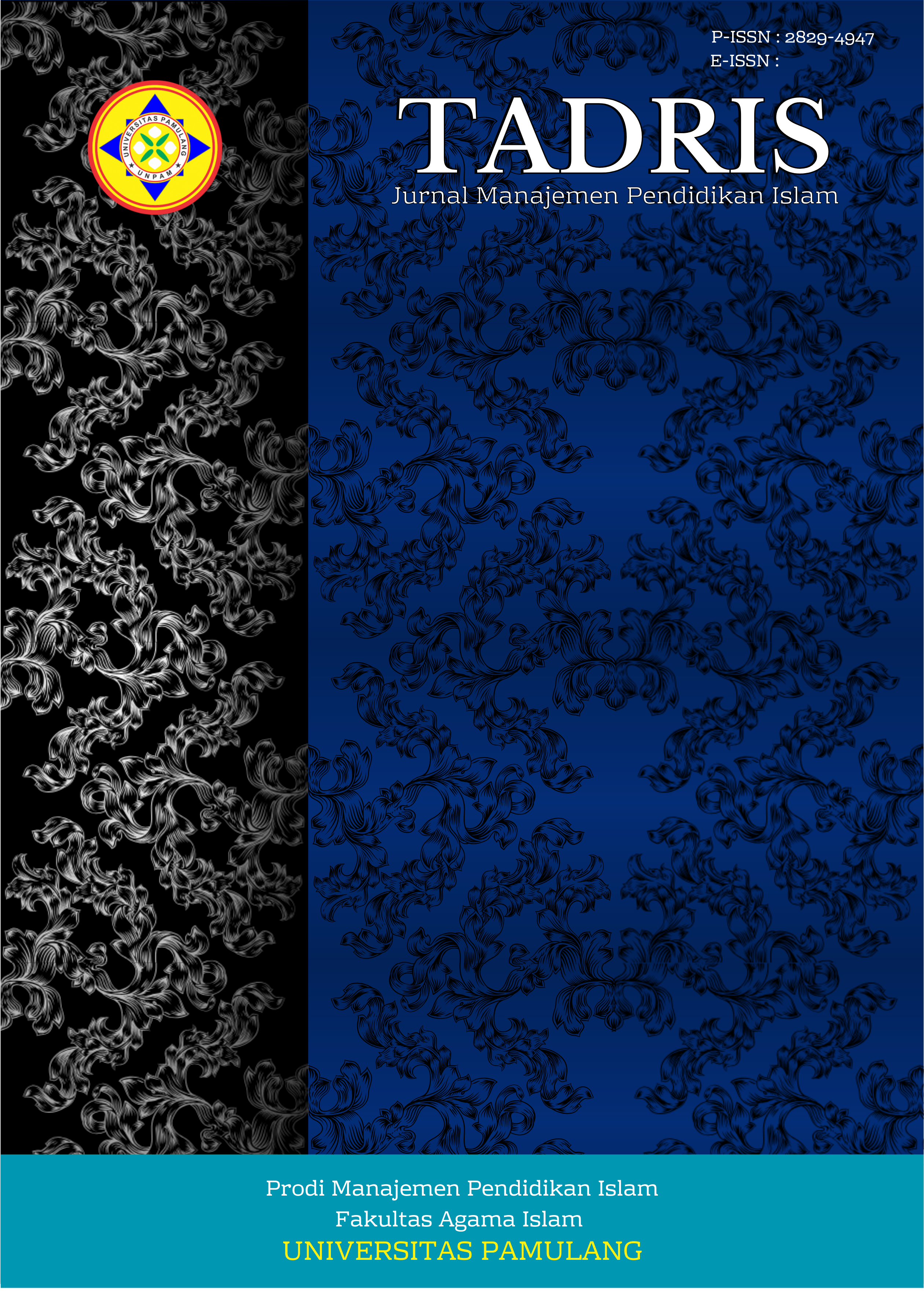Pola Kepemimpinan Kiai Dalam Penerapan Nilai Pesantren Di Era Digital
Keywords:
Role, Charismatic Leadership, Islamic Boarding SchoolAbstract
The study aims to determine the role of charismatic leadership in the implementation of Islamic boarding school values at the Assadiyah Belawa Baru Islamic Boarding School. This study uses a qualitative method. Primary data comes from the head of the boarding school, teachers and students. Charismatic kyai have a strategic role in efforts to develop. Kiai are used as role models by the community inside and outside the boarding school. The characteristics of charismatic kyai leadership include: 1) Idealized Influence, a kyai has an influence on, namely: (a) envisioning; (b) energizing; and (c) enabling. Envisioning. 2) Inspirational motivation, as a leader requires a high level of style and skills. 3) Individual Condescension, a Kyai can have an influence on the group in the group. 4) Intellectual Stimulation, the advantage is that intellectuals tend to show a fairly large sense of responsibility. Implementation of Islamic boarding school values in the era of technological revolution 4.0, namely as follows: a) Moral values towards Allah by performing the five daily prayers in congregation; The five daily prayers are a medium of communication between humans and Allah SWT, because the requirements for valid prayers are being sane and having reached puberty. b) Breaking the Sunnah Fast Together. This activity is programmed once a month with the division of those responsible for implementing it per class.
References
Acree, L., Acree, L., Gibson, T., Mangum, N., Wolf, M. A., Kellogg, S., & Branon, S. (2017). Supporting School Leaders in Blended Learning with Blended Learning. Journal of Online Learning Research, 3(2), 105–143.
Arpannudin, I. (2016). Implementasi Nilai Sosial UkhuwahIslamiah Di PondokPesantren. Humanika, 16(1), 1–14. https://doi.org/10.21831/hum.v16i1.12069
Banks, J., &Mhunpiew, N. (2012). Authentic Leadership, Social Cognitive Theory, and Character Education: The Transforming of Theories Into Practices. Online Submission, 12, 1002–1006.
Jamal, N. (2015). Transformasi Pendidikan Pesantren Dalam Pembentukan Kepribadian Santri. Jurnal Pendidikan Islam, 8(2), 64–100.
Jasminto. (2018). URGENSI TEORI ANDRAGOGI DALAM MEMPERKUAT VISI MODERAT ISLAM DI INDONESIA. Proceedings of Annual Conference for Muslim Scholars, April, 643–651.
Mansyur, A. Y. (2013). Personal prophetic leadership. Jurnal Pendidikan Karakter, Tahun III(1), 15–27.
Masruhan. (2009). Pemikiran Kyai NU tentang Relasi Agama dan Negara. Al-Qānūn, 12(1), 79–105.
MASTURAINI, Y. (2022). Penanaman Nilai-Nilai Moderasi Beragama Di Pondok Pesantren (Studi Pondok Pesantren Shohifatusshofa Nw Rawamangun …. Tadarus Tarbawy, 4(1), 19–31. http://repository.iainpalopo.ac.id/id/eprint/3610/1/MASTURAINI.pdf
Muadin, A. (2017). Manajemen Pemasaran Pendidikan Pondok Pesantren Tahfidz Qur’an. Ta’allum: Jurnal Pendidikan Islam, 5(2), 293–308. https://doi.org/10.21274/taalum.2017.5.2.293-308
Muliono, S. (2015). Makna Takfîr Pemimpin bagi Kaum Salafi. Teosofi: Jurnal Tasawuf Dan Pemikiran Islam, 1(2), 231. https://doi.org/10.15642/teosofi.2011.1.2.231-250
Muttaqin, A. M. (2019). Pesantren, Kyai dan Santri. Jurnal Tawadhu, 3(4), 13.
Rodliyah, Hj. S. (2016). MANAJEMEN PONDOK PESANTREN BERBASIS PENDIDIKAN KARAKTER (Studi Kasus di Pondok Pesantren “Annuriyyah” Kaliwining Kecamatan Rambipuji Kabupaten Jember). Cendekia: Jurnal Kependidikan Dan Kemasyarakatan, 12(2), 299. https://doi.org/10.21154/cendekia.v12i2.230
Sagala, S. (2015). Manajemen Dan Kepemimpinan Pendidikan Pondok Pesantren. JurnalTarbiyah, 22(2), 205–225.
Shah, S. (2006). Educational leadership : an Islamic perspective Saeeda Shah *. 32(3), 363–385. https://doi.org/10.2307/30000004
Sumardi, K. (2012). Potret Pendidikan Karakter Di Pondok Pesantren Salafiah. Jurnal Pendidikan Karakter, 3. https://doi.org/10.21831/jpk.v0i3.1246
Yunus, M. (2020). SOSIAL-BUDAYA: HARMONISASI AGAMA DAN BUDAYA DALAM PENDIDIKAN TOLERANSI. Kalam Jurnal Agama Dan Sosial Humaniora, 8(2), 1–26.
Yunus, Y. (2018). PROSPEK PENGEMBANGAN PONDOK PESANTREN KECAMATAN MALANGKE KABUPATEN LUWU. Jurnal Ilmiah Iqra’, 12, 88–105.
Yunus, Y., Mukhtar, J., & Nugroho, I. (2019). MANAJEMEN PENGEMBANGAN PONDOK PESANTREN (Studi Kasus di Pondok Pesantren As’adiyah Belawa Baru, Masamba, Sulawesi Selatan). Al-Tanzim : Jurnal Manajemen Pendidikan Islam, 3(1), 82–101. https://doi.org/10.33650/al-tanzim.v3i1.506
Downloads
Published
Versions
- 2024-11-30 (2)
- 2024-11-30 (1)





